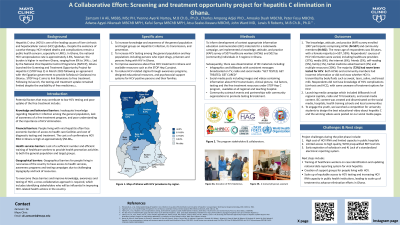Sunday Poster Session
Category: Liver
P1185 - A Collaborative Effort: Screening and Treatment Opportunity Project for Hepatitis C Elimination in Ghana
Sunday, October 27, 2024
3:30 PM - 7:00 PM ET
Location: Exhibit Hall E

Has Audio

Zamzam Ismail Artan Ali, MBBS, MSc
Mayo Clinic School of Graduate Medical Education
Rochester, MN
Presenting Author(s)
Zamzam Ismail Artan. Ali, MBBS, MSc1, Yvonne Ayerki. Nartey, MBBCh, PhD2, Charles Ampong. Adjei, PhD3, Amoako Duah, MBChB4, Peter Fosu, MBCh5, Lewis R Roberts, MBChB, PhD6
1Mayo Clinic School of Graduate Medical Education, Rochester, MN; 2Cape Coast Teaching Hospital, Cape Coast, Central, Ghana; 3University of Ghana, Accra, Greater Accra, Ghana; 4University of Ghana Medical Center, Accra, Greater Accra, Ghana; 5Hepatitis Alliance of Ghana, Accra, Greater Accra, Ghana; 6Mayo Clinic Health System, Rochester, MN
Introduction: Hepatitis C virus (HCV) is one of the leading causes of liver cirrhosis and hepatocellular cancer (HCC) globally. Despite the existence curative therapy, HCV-related deaths and complications remain a public health concern, especially in LMICs. In Ghana, the national HCV seroprevalence from is approximately 2.6%. However, the burden is higher in northern Ghana, ranging from 8% to 14%. Led by its National Viral Hepatitis Control Programme (NVHCP), Ghana launched the Screening and Treatment Opportunity Project for Hepatitis C (STOP HepC) in March 2023 following an agreement with the Egyptian government to provide HCV medications Sofosbuvir/daclatasvir. STOP HepC aims to link 50,000 Ghanaians to free HCV treatment. (figure 1). To increase STOP HEPC enrolment, a nationwide education and awareness campaign on HCV was developed.
Methods: To inform development of context appropriate information education communication (IEC) materials for a nationwide campaign, we are implementing a knowledge, attitude, and practice (KAP) survey of 500 healthcare workers (HCWs) and 500 lay (community) individuals in 3 regions in Ghana.
Theory of change for this project is attached. (table 1)
Results: A pilot study of the KAP enrolled 33 participants comprising HCWs (N=18) and community (N=15). The mean age of respondents was 30 years, with a female majority (n=X, 61%). Respondents' sources of HCV information were varied, including healthcare providers (50%), media (20%), the internet (10%), friends (10%), self-reading (7%), and family (3%). The majority (73%) had never been tested for HCV. Both HCWs and community members had incorrect information or didn’t know whether HCV is transmitted by body fluids such as sweat, tears, saliva, and breast milk. Respondents didn’t have knowledge of HCV complications (cirrhosis and HCC), with some unaware of treatment options for HCV.
Discussion: The pilot survey was conducted to test the survey design and ensure target population could clearly understand the questions. It aimed to identify and avoid potential errors in study design and methodology. Next steps for this project include implementing a national KAP survey by July 2024. Media campaign launched by end of July will utilize billboards across all regions, radio and TV broadcasts, and social media content to raise awareness. This will be followed by training healthcare workers on case identification and updating the national data reporting system for viral hepatitis.

Note: The table for this abstract can be viewed in the ePoster Gallery section of the ACG 2024 ePoster Site or in The American Journal of Gastroenterology's abstract supplement issue, both of which will be available starting October 27, 2024.
Disclosures:
Zamzam Ismail Artan. Ali, MBBS, MSc1, Yvonne Ayerki. Nartey, MBBCh, PhD2, Charles Ampong. Adjei, PhD3, Amoako Duah, MBChB4, Peter Fosu, MBCh5, Lewis R Roberts, MBChB, PhD6. P1185 - A Collaborative Effort: Screening and Treatment Opportunity Project for Hepatitis C Elimination in Ghana, ACG 2024 Annual Scientific Meeting Abstracts. Philadelphia, PA: American College of Gastroenterology.
1Mayo Clinic School of Graduate Medical Education, Rochester, MN; 2Cape Coast Teaching Hospital, Cape Coast, Central, Ghana; 3University of Ghana, Accra, Greater Accra, Ghana; 4University of Ghana Medical Center, Accra, Greater Accra, Ghana; 5Hepatitis Alliance of Ghana, Accra, Greater Accra, Ghana; 6Mayo Clinic Health System, Rochester, MN
Introduction: Hepatitis C virus (HCV) is one of the leading causes of liver cirrhosis and hepatocellular cancer (HCC) globally. Despite the existence curative therapy, HCV-related deaths and complications remain a public health concern, especially in LMICs. In Ghana, the national HCV seroprevalence from is approximately 2.6%. However, the burden is higher in northern Ghana, ranging from 8% to 14%. Led by its National Viral Hepatitis Control Programme (NVHCP), Ghana launched the Screening and Treatment Opportunity Project for Hepatitis C (STOP HepC) in March 2023 following an agreement with the Egyptian government to provide HCV medications Sofosbuvir/daclatasvir. STOP HepC aims to link 50,000 Ghanaians to free HCV treatment. (figure 1). To increase STOP HEPC enrolment, a nationwide education and awareness campaign on HCV was developed.
Methods: To inform development of context appropriate information education communication (IEC) materials for a nationwide campaign, we are implementing a knowledge, attitude, and practice (KAP) survey of 500 healthcare workers (HCWs) and 500 lay (community) individuals in 3 regions in Ghana.
Theory of change for this project is attached. (table 1)
Results: A pilot study of the KAP enrolled 33 participants comprising HCWs (N=18) and community (N=15). The mean age of respondents was 30 years, with a female majority (n=X, 61%). Respondents' sources of HCV information were varied, including healthcare providers (50%), media (20%), the internet (10%), friends (10%), self-reading (7%), and family (3%). The majority (73%) had never been tested for HCV. Both HCWs and community members had incorrect information or didn’t know whether HCV is transmitted by body fluids such as sweat, tears, saliva, and breast milk. Respondents didn’t have knowledge of HCV complications (cirrhosis and HCC), with some unaware of treatment options for HCV.
Discussion: The pilot survey was conducted to test the survey design and ensure target population could clearly understand the questions. It aimed to identify and avoid potential errors in study design and methodology. Next steps for this project include implementing a national KAP survey by July 2024. Media campaign launched by end of July will utilize billboards across all regions, radio and TV broadcasts, and social media content to raise awareness. This will be followed by training healthcare workers on case identification and updating the national data reporting system for viral hepatitis.

Figure: Figure 1: Donation of HCV Medicines
Note: The table for this abstract can be viewed in the ePoster Gallery section of the ACG 2024 ePoster Site or in The American Journal of Gastroenterology's abstract supplement issue, both of which will be available starting October 27, 2024.
Disclosures:
Zamzam Ali indicated no relevant financial relationships.
Yvonne Nartey: Gilead – Grant/Research Support.
Charles Adjei indicated no relevant financial relationships.
Amoako Duah indicated no relevant financial relationships.
Peter Fosu indicated no relevant financial relationships.
Lewis R Roberts indicated no relevant financial relationships.
Zamzam Ismail Artan. Ali, MBBS, MSc1, Yvonne Ayerki. Nartey, MBBCh, PhD2, Charles Ampong. Adjei, PhD3, Amoako Duah, MBChB4, Peter Fosu, MBCh5, Lewis R Roberts, MBChB, PhD6. P1185 - A Collaborative Effort: Screening and Treatment Opportunity Project for Hepatitis C Elimination in Ghana, ACG 2024 Annual Scientific Meeting Abstracts. Philadelphia, PA: American College of Gastroenterology.
